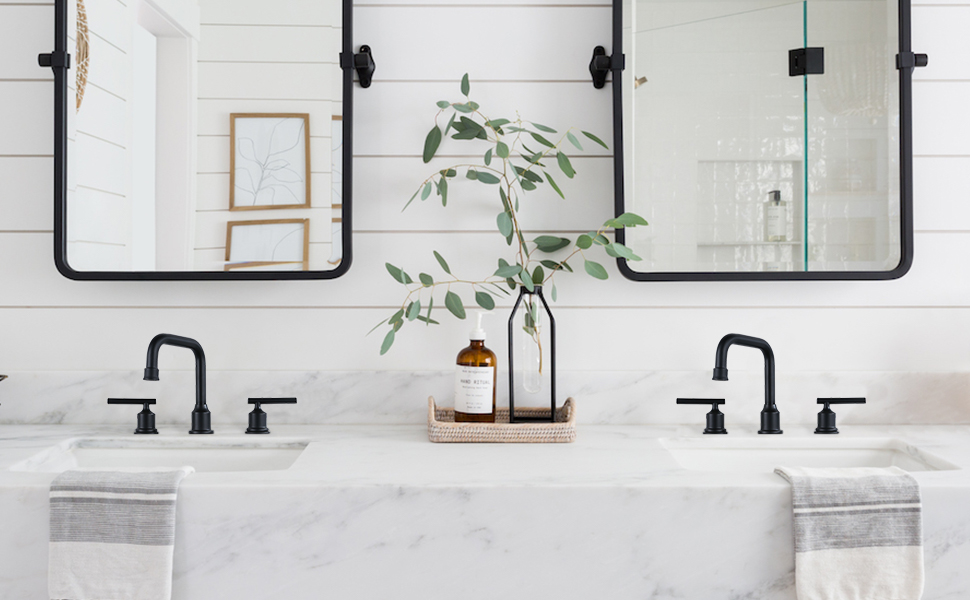Į ką reikia atsižvelgti perkant vonios maišytuvus
Sink and Plumbing Compatibility:
When it comes to purchasing new bathroom faucets, the first thing you have to look for is compatibility with your sink, according to Kelly Russum, owner and CEO of KC’s 23 1/2 Hour Plumbing & Air Conditioning. “Look at the number of holes in the sink and the distance between them. Typically, most sinks have one to three holes,” he explains. “Widespread faucets, which have separate handles for hot and cold water, usually require three holes spaced 8 inches apart, while single-hole faucets combine the spout and handles into one unit.”
You should also keep in mind that many newer faucets can be quite versatile. Pavyzdžiui, many single-hole faucets include a deck plate that allows the faucet to be installed on a sink that has one or three holes. Tuttleman advises measuring the spacing between the holes to see if your new bathroom faucets is compatible with your existing deck or vanity surface.

Į ką reikia atsižvelgti perkant vonios maišytuvus
Bathroom Faucets Material:
one of the most important components of a bathroom faucet is the valve that controls water flow and temperature. “High-quality valves made of solid brass or with ceramic disks are more durable and less prone to leakage,” he says. Additionally, he points out that the faucet’s aerator is an essential component. This piece, which is found at the tip of the faucet spout, mixes air with water to create a uniform spray without splashing. “Quality aerators help save water without sacrificing performance, and some are designed to be easily cleaned or replaced, which can be helpful in hard water areas,” says Russum.
Water Flow Rate:
The standard water flow rate is 2.2 gallons per minute. Recommend looking for a bathroom faucet that is WaterSense-certified. WaterSense-labeled bathroom faucets are high-performance faucets that have a maximum flow rate of 1.5 gallons per minute. According to the United States Environmental Protection Agency (EPA), a WaterSense-certified faucet and aerator can save the average family 700 gallons of water per year, arba 11,000 gallons of water over the faucet’s lifetime.
Handle Type:
There are several different types of handles. Single-handle bathroom faucets,have a single lever that controls both the temperature and flow of the water. A double-handle faucet has one handle for cold water and another handle for hot water. Finally, there are touchless options are both convenient and hygienic.
According to usage, lever handles are often preferred for their ergonomic design and ease of operation. When deciding which handle type to select, will recommends taking into consideration ease of use, design compatibility, and personal preference.
Spout Type:
The height and length of the spout are important factors to consider. Tall options, although they may give the sink a spectacular look, may not be suitable for every sink and will result in constant splashes and streaks all around.
Tuttleman adds that trough-style faucets have become increasingly popular in recent years. Tačiau, “… a flat trough doesn’t allow for the water to run off after the faucet is shut off … water will dry in the trough and hard water deposits form,” she cautions.
Installation Process:
Once you’ve selected bathroom faucets that’s compatible with your existing sink, advises checking the size and type of the water lines to ensure you can connect the new faucet without major modifications. “Common sizes are 3/8-inch and 1/2-inch diameter,And remember that some faucets come with built-in supply lines, while others require a separate purchase. If you’re not sure or if you have to modify your existing plumbing, will recommends contacting your local plumber before attempting installation.
 iVIGA čiaupų gamyklos tiekėjas
iVIGA čiaupų gamyklos tiekėjas
